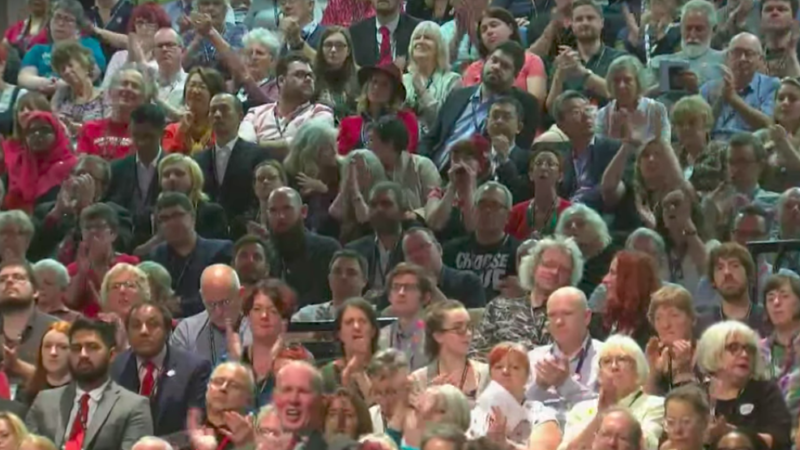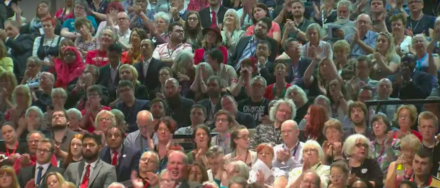

He entered to the now familiar sound of supporters singing “Oh, Jeremy Corbyn”, the tune which has echoed around Brighton over the last week.
He quickly changed the mood, however, switching to a picture of Britain in social decay set to a soundtrack of Tory cuts and their divide-and-rule style of politics.
The run-up to Corbyn’s speech had been upbeat, or even celebratory, and although the Labour leader tapped into that today he also set out a bleak vision of a country in which privatisation and chronic inequality had come together with lethal force in the Grenfell Tower tragedy this summer.
It meant that Corbyn – more calm and confident with each month – was on familiar territory when he delivered his keynote speech today. Britain’s housing failure risks life chances, with a whole generation priced out of the market and, in some cases, risks more lives.
Corbyn covered a lot of other big topics – like Brexit and austerity – before getting to the heart of his speech: the “chilling wreckage” of Grenfell in west London.
“A horrifying fire in which dozens perished an entirely avoidable human disaster,” he said.
“One which is an indictment not just of decades of failed housing policies and privatisation and the yawning inequality in one of the wealthiest boroughs and cities in the world, it is also a damning indictment of a whole outlook which values council tax refunds for the wealthy above decent provision for all.”
Corbyn knows this is a tragedy which may end up defining a range of problems for a generation, divides of race, class and housing typified by the loss of around 80 lives – although the final death toll remains unknown – just a few streets away from one of the richest parts of the country.
Corbyn could not be accused of making political capital out of a human tragedy. Like many London MPs, he has been a housing campaigner for decades as constituents have trooped in and out of his surgery with tales of neglected people and property.
This was the idealistic Corbyn’s audition for the role of prime minister. He could be hopeful that after his strong general election campaign he would have more willing listeners to his televised address today than at any other point in his leadership.
He gave them what they wanted with promises to rebuild the NHS, cut school class sizes and deliver a Brexit that protects jobs. That is, of course, the role of leader of the opposition, but only time will tell whether the traditional conference season pledges will be delivered. The coverage of John McDonnell’s proposal to bring “in-house” private finance initiative contracts and the reaction to his comments on Labour members’ “war gaming” of a run on the pound give us a flavour of what might await Corbyn’s speeches when the first editions of tomorrow’s newspapers roll out this evening.
Corbyn won’t be bothered about that, however. He aimed a few jibes at the “establishment pundits” as he reminded people he had led Labour to its largest increase in its vote since 1945.
He reserved special treatment for the Daily Mail, however, following its lengthy take-down of Labour’s people and policies 24 hours before the general election, and sneered at the right-wing press.
“They ran the campaign they always do under orders from their tax exile owners to trash Labour at every turn. The day before the election one paper devoted 14 pages to attacking the Labour Party. And our vote went up nearly 10 per cent.
“Never have so many trees died in vain. The British people saw right through it. So this is a message to the Daily Mail’s editor- next time, please could you make it 28 pages?”
This is the Ed Miliband approach taken to the max. Announce some left-wing policies in the same breadth as some radical language and then stand back to watch the traditional media attack you as a risk to your job, your home, your country – and then try to make a virtue out of the reaction.
Corbyn seems to have a loathing for elements of the media and the politicians and business people with whom they work. In the passage on Grenfell, which was the most impassioned of the afternoon, he warned of a “whole outlook…which has contempt for working class communities”.
Our party is on their side but it hasn’t yet won them over in sufficient number. The general election was seen by some as a tale of growing middle class support for Labour while blue-collar Tories stuck with Theresa May despite her faltering campaign. With Corbyn ending up 56 seats behind the prime minister he needs to bring in more votes from people on low incomes and reclaim lost heartland seats, like Middlesborough South and East Cleveland, which went blue in June.
Corbyn was thoughtful today and even delivered a few jokes, which have never been his strong point. He is far more at ease than a year or two ago and the thirst for social justice which coursed through his 6,000-word address will have delighted many Labour members and voters, as well as quite a few MPs.
What he didn’t do, however, was mention some other big issues, such as the deficit or anti-Semitism. For him to complete the extraordinary journey from Islington backbencher to 10 Downing Street then he needs to show he is gripped by the seriousness of these issues as well. This was a confident, crusading speech – now the policy and prime ministerial tone must follow.




More from LabourList
‘Labour council candidates – it’s tough, but all is not lost’
‘Labour won’t stop the far right by changing leaders — only by proving what the left can deliver’
‘Cutting Welsh university funding would be economic vandalism, not reform’